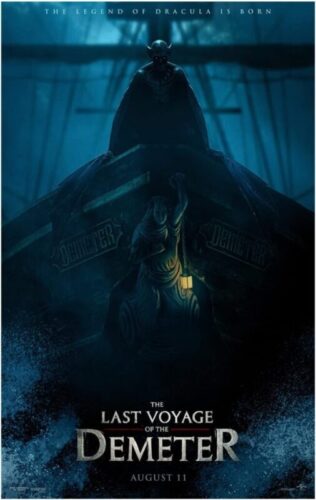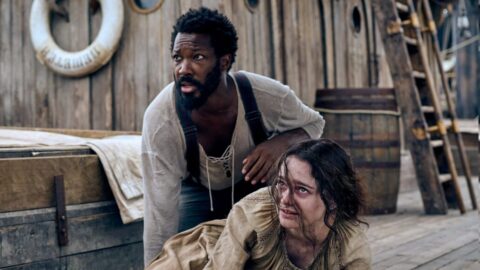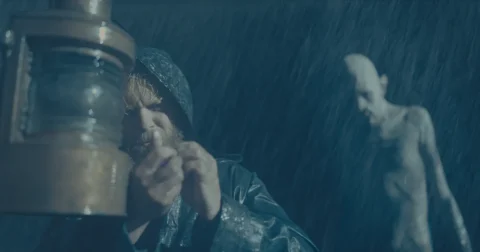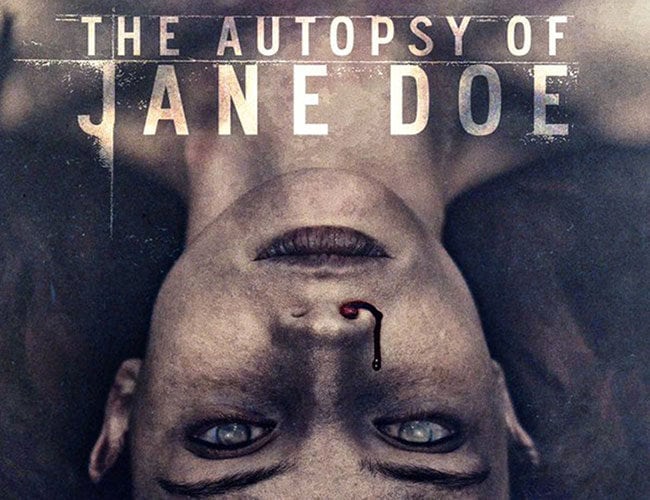The Last Voyage of the Demeter (2023)
Directed by: André Øvredal
Written by: Bragi Schut Jr., Zak Olkewicz
Starring: Aisling Franciosi, Corey Hawkins, Javier Botet, Liam Cunningham
USA
AVAILABLE ON DIGITAL, BLU-RAY and DVD [the latter two Region A / 1 only]
RUNNING TIME: 119 mins
REVIEWED BY: Dr Lenera

On August 6, 1897, the merchant ship “The Demeter” washes ashore in England. Among the wreckage found by the police is a captain’s log. Four weeks earlier, the same ship makes port in Varna, Bulgaria, picking up cargo transportation to London. The shipment, consisting of multiple large wooden crates, is transported by Romanians, who refuse to help load it while a crew member leaves when he sees the dragon emblem on the crates; At sea, new recruit Clemens and Olgaren see a mysterious figure in the fog on deck, then one of the crates falls and breaks open; Clemens finds a woman buried in dirt inside called Anna and performs blood transfusions on her to fight against a seeming infection. The following night, all of the animals aboard the ship are killed. Anna tells Clemens that the culprit is an evil monster in her village named Dracula, to whom she was bound….

I’m not sure of the exact year when I first read “Dracula” by Bram Stoker. It was around the mid-80s while I was in my mid teens – but it sure made an impression on me, especially one particular chapter. I’d already seen the 1931 film version from Universal, and the 1958 one from Hammer, plus of course some of the sequels, but none of the more faithful big and small screen adaptations – and if you’re not big into this stuff then it may surprise you to learn that 1992’s so-called Bram Stoker’s Dracula, while an absolutely marvelous slice of pantomime Gothic, wasn’t quite what its title said it was, nor the first version to attempt to be close to the book. So reading the novel was a most interesting experience, and at times a rather frightening one too. Most frightening was “The Captain’s Log”, where, in keeping with the rest of the way the novel is told [which really does work well and must have greatly enhanced the fear factor for those Victorians], events are told from the point of view of a ship captain’s journal. It narrates the crew’s disappearance until only the captain remains, bound to the helm to maintain course. And, even though I saw a great many Dracula films afterwards, they tended to either ignore this section even though it seemed to me to be prime chiller material, or rush through it. Then 2020 saw a three-part BBC version from those two writers I tend to either love or hate Mark Gatiss and Ivan Moffat, the middle chapter was an adaptation of “The Captain’s Log”, and generally did well with it even though it lost it a little in parts and towards the end. And now we have The Last Voyage Of The Demeter, a big screen expansion. Well actually no, the UK and a lot of other territories saw this bypass the cinemas and only eventually turn up rather quietly on digital, depriving folks of the chance to properly own it on disc. So what went wrong?
Well, the film flopped big time in the USA, though of course this shouldn’t necessarily be taken as a sign of lack of quality. Movies fail for a variety of reasons, and many eventually have their day. While not at all an unsung masterpiece, The Last Voyage Of The Demeter works extremely well in terms of what it set out to do, using “The Captain’s Log” as an excuse to make a tense and atmospheric monster movie / body count movie on a ship, which really is a setting ripe for terror which not enough films have really exploited even though you and I could easily rattle off a list of horror films with such a setting. Credited co-screenwriter Bragi Schut Jr. actually began work on this way back in 1992, where. while working at a model shop in Hollywood, he befriended a colleague who worked on Bram Stoker’s Dracula who showed him a small model of The Demeter used for the film. This inspired him to begin writing an Alien-inspired film set aboard the ship which eventually got greenlit eleven years later, but then went through five directors – Robert Schwentke, Marcus Nispel, Stefan Ruzowitzky, David Slade and Neil Marshall before Andre Ovredal came on board, while the screenplay has been worked on by Zak Olkewicz and no less than James V. Hart who did Bram Stoker’s Dracula. I don’t know what changes were made to the script, but I sincerely hope that Schut Jr. is proud of the result and not too disheartened by the lack of interest from distributors and audiences, because it really is rather good. It probably seems rather too long at just over two hours, but as I was watching it I couldn’t think of much that I’d lose if I were the editor. We’re given a bit of time to get to know the characters without it seeming forced, but the pacing is quite tight thereafter and we actually care about most of these people, so that we don’t actually like it when they’re threatened or killed off. And those who like atmosphere, those who like gore, and those who like to jump, are all catered for with an assortment of highly effective moments.
Ignoring for now some thoroughly stupid things which do let the side down rather a lot, there’s one major issue right away. Many of us know how things end, though I do wonder if the film’s prologue was added late in the day; some shots of people walking against CG backgrounds are poor and seem to have been rushed. I suppose that those who aren’t familiar with the plot of “Dracula” should be given some information, but did we need text telling us of The Demeter having been found derelict, and that this is the story of its crew, and that it’s based on “The Captain’s Log”, to be followed by a scene where people see the ship having run aground in Whitby Bay [though it doesn’t look anything like Whitby Bay] and others investigate it? Surely one or the other would have sufficed? But the opening shot of torches followed by men coming out of darkness on a dark, rainy day is impressive and a good indicator of what will come in a visual sense, and when the log is found [which takes place offscreen, withholding us from going onboard for a bit], somebody reads, “This log is a record and a warning, and if it finds you god help you, as he has abandoned the Demeter, we tried to stop him, we didn’t succeed – God have mercy on your souls“, also heard in a voiceover which certainly sets the right mood for what’s to follow. Four weeks earlier, “The Demeter” makes port in Varna, Bulgaria, picking up cargo transportation to London. The shipment, consisting of multiple large wooden crates, is transported by locals from Romania, who refuse to help load it and wish the crew good luck. Clemens, a doctor, overhears that the ship is looking for crew members. He attempts to convince the crew that he’d be valuable because of his medical skills and education in astronomy at Cambridge, but is initially rejected by first mate Wojchek. But then he saves the captain’s grandson, Toby, from being crushed. The ship’s captain, Elliott, is impressed and invites Clemens to join the crew, replacing a new hire who left when he saw the dragon emblem on the crates.

Eliott’s grandson Toby and Clemens bond, and all the crew members are given enough personality to make them seem like human beings. Some of this is done during a dinner table discussion when they’re saying who they’d spend their money. Obviously some intend to spend it on women, causing Toby to say, “I’m almost nine, I know what a brothel is anyway, it’s a place where you pay women to take off their knickers”, which is the only real laugh in a mostly serious endeavour. But Clemens’s lack of interest in money and desire “to understand this world” seems like a scriptwriter element that for whatever reason was muted, and did we really need a scene later on where he explains that he’s the first qualified black doctor from Cambridge but couldn’t practice? But then again I’d bet my life that Schut Jr.’s original screenplay didn’t have Clemens as black and therefore no racial material. Anyway, some animals aboard are going crazy and something obviously fell in the cargo hold. Clemens finds Anna stowing away, via a really good jump scare of somebody moving under cloth, and we cut to Dracula waking up and getting out of coffin, though not shown in much detail. Yes, the film shows its hand nice and early, which for some may make the successive conversations and even arguments about what’s going on a bit redundant, but I found it fun to see them trying to work things out, possibilities ranging from rabies to “a punishment brought for our sins”, suspense over surprise [though of course not a surprise for many]. The first victim is, I’m sorry to tell you, the ship’s dog. He or she goes to investigate something sensed and begins to whine and bark before obviously seeing something and backing off. We don’t see the killing, but don’t take this as an indication that we won’t see any kills later on! Soon all the rats have been driven off by something, and then all the animals are killed off; the sights we’re shown of this ain’t nice. The crew throws them all overboard, but then humans begin to be killed off too. Could the culprit be this powerful demonic entity to whom Anna’s village “promise” women every now and again for protection?
Of course the events that ensure can’t be that unpredictable and diverse, but the film does try to keep things exciting. With no dialogue and quick but usually highly effective appearances, this Dracula, a cross between Nosferatu‘s Orlak and those creatures from The Descent, is used entirely as a device to scare. It’s hard to see this monster as the suave seducer we’re familiar with, but it makes sense in terms of the film and this part of the story, and Javier Botet makes his usual valiant attempts for us to see him acting his socks off. Elsewhere CGI is very prevalent, but a bit where a big fog envelopes the ship may seem over the top but is in the book [though the fog isn’t green]. Slasher fans will love some of the kills; there’s certainly plenty of graphic detail, from flesh being ripped into to faces being bashed on the floor, but it’s the way that these scenes are filmed which really makes them work. Director Andre Ovredal and editors Julian Clarke, Patrick Largaard and Christian Wagner do a tremendous job of maximising horror moments so that they achieve their full potential. There’s a truly fine jump scare involving binoculars, but such admittedly very good moments wouldn’t work the way that they do without the sense of unease then fear that’s been built up in a really rather masterly fashion. There’s a superb bit when one of the first victims to be is on the deck and espies something in a small area that’s lit up yet we can’t truly discern it; we feel, as horror lovers, the allure of being driven to places where something nasty is waiting, and also the fear of “don’t go there”. Sound effects are used incredibly well in such scenes, truly helping to create the appropriate mood, a mood that’s generally well maintained by Ovredal who does almost as good a job here as he did in Trollhunter. Tom Stern’s cinematography is also notable throughout, making fine use of his limited and dark colour schemes which could have easily made for a visually dull effort.
What may surprise some is how emotionally affecting some scenes are [and the order in which people get killed], especially in the final act where the music score by the rather erratic Bear McCreary, which previously has been mostly content to add to the tension and work more as sound design, really comes into its own, with the performance from Corey Hawkins as Clemens also really going into full gear. Of course, this being a modern film, we have to have a moment where Clemens is about to instruct the only female character in how to defend herself but she immediately shows that she don’t need no man in this area, though Aisling Franciosi does excellently as Anna in a film with expertly judged performances from top to bottom and a cast which works very well together. The Last Voyage Of The Demeter ends with a suggestion that the story will continue in the way almost, but not quite, that the novel does, which is a bit unnecessary really. And if you think about it, these sailors are a bit crap, constantly avoiding the sensible option of heading for the nearest port despite the terrible things going on because of that bonus check, clearly not having seen a map of Europe judging by them saying that England is the closest port which it wouldn’t be until nearly at the end of their journey, and not even properly searching the ship for Dracula even when it’s made clear that he doesn’t like daylight, so looking for him during the day ought to be a no-brainer. The dolts! But this unfortunately neglected effort still works where it really counts, and is a worthy addition to the list of Dracula films that matter.








Is this actually streaming?